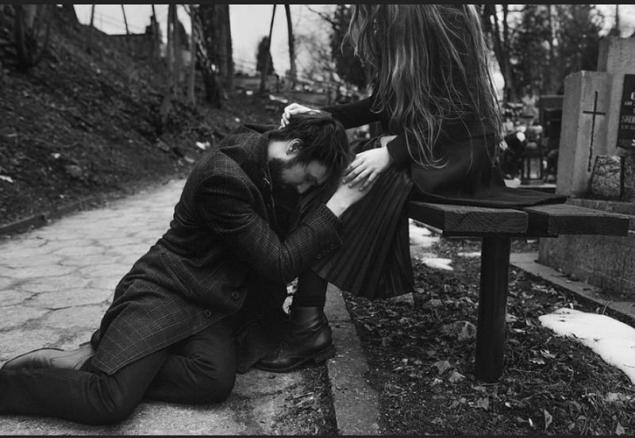627
Liz Burbo: People cannot recover without FORGIVING yourself
I want to reiterate that people cannot get well without forgiving himself. This fundamental stage allows the possibility of transformation not only of our love to themselves but also to the heart and blood in our body.
This new blood is filled with energy-found love, lose all the body like a miraculous balm, and heal all cells in its path. Even if your common sense does not allow you to believe it – try still, because you have nothing to lose.

Here are the steps of true forgiveness has already been passed by thousands of people and be rewarded with wonderful results:
1. Define your own emotions (often they can be several). Realize what you accuse yourself or the other person, and determine what feelings you're.
2. Take some responsibility. To take responsibility means to realise that you always have a choice to react with love or with fear. What are you afraid of? Now realize that you're probably afraid to be accused of the same, what blame the other person.
3. Understand the other person and take the edge off. In order to relieve tension and to understand the other person, put yourself in his place and feel his intentions.Think about that, and he probably blames himself and you in the same, than you blame him. He's afraid, just like you.
4. Forgive yourself. This is the most important stage of forgiveness. In order to forgive yourself, give yourself the right to be afraid, to show weakness, to err, to have flaws, to suffer and to be angry. Accept yourself the way you are currently, knowing that this is a temporary state.
5. Feel the desire to apologize. Preparing for the stage, imagine that I ask forgiveness from the person you judged, criticized, or something accused. If this image makes you feel joy and freedom, are you ready for the next stage.
6. Meet the man who want to apologize. Tell him your feelings and ask forgiveness for what condemned, criticized or hated him. That you've forgiven him, mention only if he talked about it.
7. Make a connection or make a decision against the parent. Remember a similar situation in the past with the person representing to you the power, authority, father, mother, grandfather, grandmother, teacher, etc. This person should be the same sex as the person you just forgave. Repeat with him all the stages of forgiveness.
If the emotions you are going through, directed against yourself, go through steps 1, 2, 4 and 7

Tips · Give yourself the time needed to complete all the stages of forgiveness. At one point you might want to day the other year; most importantly, your desire to pass these stages was sincere. The stronger the psychological trauma and the resistance of the ego, the more you will need time.
· If step 6 will be very difficult, know that it's your ego resists. If you think: "why should I apologize to this person, if not I offended him, and he me? I had every reason to be mad at him!" this tells your ego, not your heart. Most importantly, the desire of your heart is to live in peace and compassion for others.
· Do not worry if the person you're sorry, will not respond as you expected. Some things are almost impossible to predict. He can say nothing, change the subject, to wonder, to refuse to talk about it, to cry, to apologize to you, rush at you, etc. Try to understand the other person's feelings – as to their own.
· As I noted in the description of the sixth stage of forgiveness, you don't have to talk to the person who hurt you, that forgave him. There are three reasons:
1. It may be that the person you're angry does not have the intention to hurt you. The reality very often differs from our perception. Maybe this man did not even suspect that you are offended.
2. You have to understand that forgiveness you need to free yourself. To forgive another person means to make the necessary step to forgive himself.
3. You must realize also that it is not in your power to truly forgive the other person. Only he can forgive.
· If the person does not want to accept your request for forgiveness, it means that he cannot forgive. You can forgive them, but not enough. He must forgive yourself. You are only responsible for yourself, but the fact that you forgive yourself, can help another person to forgive yourself.
· If you tell another person about their experiences, and he by surprise, begins to make excuses, he may think you're accusing him of. If so, then you haven't forgiven this man and hope that he will change.
· If you're going to meet that person, hope that he will understand the depth of your suffering and ask for your forgiveness, you still wouldn't forgive him. In any case, you shouldn't be angry at yourself; you just need some more time for transition to stages 2 and 3. Probably, you have already forgiven this man's mind, but have not had time to forgive his heart. Forgive the human mind is to understand the motives of his actions, but it does not bring any relief, no inner liberation. It happens a lot. The forgiven mind is a good start, as it at least demonstrates good will.
· Remember: to forgive someone does not mean that you agree with his accusations. Forgiving someone, you would say that looking through the eyes of the heart and see something more important at heart this man than his charges.
· Due to this forgiveness, you will be easier to give yourself the right to be themselves and to show their human feelings.
Now let's look at three emotions that people are experiencing most difficult: fear, anger, and sadness. These emotions people usually suppresses, controls, hides – in short, doing everything to them not to worry, as they reopen wounds received in childhood and adolescence. These wounds arise under the influence of the five negative psychological factors: trauma rejected, abandoned injury, trauma, humiliation, betrayal and injustice.
Instead of giving yourself the right to be imperfect and suffer from emotional wounds, most people continues to blame others, including their reasons for their fear, anger and sadness. That is why people are experiencing so many negative emotions and emotions in turn cause various diseases.
But these emotions can be used for good:
· Fear helps you to understand that you need protection and looking for her. He recalls that the protection should be sought in itself.
· Anger is useful because it helps you to discover your need for self-esteem, articulate their demands and to listen more closely to their needs.
· Grief helps you to understand that you are suffering from feelings of loss or fear to lose. Grief teaches man not to become attached.
To LOVE oneself means to take responsibility for your life and give yourself the right to exercise this responsibility. If you love yourself, you will be healthy and full of energy body that will allow you to realize all your dreams.
I hope this book will help you gain a deeper awareness, a more fulfilling and happy life filled with love. Never forget that your inner GOD is using every means possible and using your body says, reminds you: "LOVE YOURSELF!" published by ©Liz Burbo
Source: solium.ru/forum/showthread.php?p=128979#post128979
This new blood is filled with energy-found love, lose all the body like a miraculous balm, and heal all cells in its path. Even if your common sense does not allow you to believe it – try still, because you have nothing to lose.

Here are the steps of true forgiveness has already been passed by thousands of people and be rewarded with wonderful results:
1. Define your own emotions (often they can be several). Realize what you accuse yourself or the other person, and determine what feelings you're.
2. Take some responsibility. To take responsibility means to realise that you always have a choice to react with love or with fear. What are you afraid of? Now realize that you're probably afraid to be accused of the same, what blame the other person.
3. Understand the other person and take the edge off. In order to relieve tension and to understand the other person, put yourself in his place and feel his intentions.Think about that, and he probably blames himself and you in the same, than you blame him. He's afraid, just like you.
4. Forgive yourself. This is the most important stage of forgiveness. In order to forgive yourself, give yourself the right to be afraid, to show weakness, to err, to have flaws, to suffer and to be angry. Accept yourself the way you are currently, knowing that this is a temporary state.
5. Feel the desire to apologize. Preparing for the stage, imagine that I ask forgiveness from the person you judged, criticized, or something accused. If this image makes you feel joy and freedom, are you ready for the next stage.
6. Meet the man who want to apologize. Tell him your feelings and ask forgiveness for what condemned, criticized or hated him. That you've forgiven him, mention only if he talked about it.
7. Make a connection or make a decision against the parent. Remember a similar situation in the past with the person representing to you the power, authority, father, mother, grandfather, grandmother, teacher, etc. This person should be the same sex as the person you just forgave. Repeat with him all the stages of forgiveness.
If the emotions you are going through, directed against yourself, go through steps 1, 2, 4 and 7

Tips · Give yourself the time needed to complete all the stages of forgiveness. At one point you might want to day the other year; most importantly, your desire to pass these stages was sincere. The stronger the psychological trauma and the resistance of the ego, the more you will need time.
· If step 6 will be very difficult, know that it's your ego resists. If you think: "why should I apologize to this person, if not I offended him, and he me? I had every reason to be mad at him!" this tells your ego, not your heart. Most importantly, the desire of your heart is to live in peace and compassion for others.
· Do not worry if the person you're sorry, will not respond as you expected. Some things are almost impossible to predict. He can say nothing, change the subject, to wonder, to refuse to talk about it, to cry, to apologize to you, rush at you, etc. Try to understand the other person's feelings – as to their own.
· As I noted in the description of the sixth stage of forgiveness, you don't have to talk to the person who hurt you, that forgave him. There are three reasons:
1. It may be that the person you're angry does not have the intention to hurt you. The reality very often differs from our perception. Maybe this man did not even suspect that you are offended.
2. You have to understand that forgiveness you need to free yourself. To forgive another person means to make the necessary step to forgive himself.
3. You must realize also that it is not in your power to truly forgive the other person. Only he can forgive.
· If the person does not want to accept your request for forgiveness, it means that he cannot forgive. You can forgive them, but not enough. He must forgive yourself. You are only responsible for yourself, but the fact that you forgive yourself, can help another person to forgive yourself.
· If you tell another person about their experiences, and he by surprise, begins to make excuses, he may think you're accusing him of. If so, then you haven't forgiven this man and hope that he will change.
· If you're going to meet that person, hope that he will understand the depth of your suffering and ask for your forgiveness, you still wouldn't forgive him. In any case, you shouldn't be angry at yourself; you just need some more time for transition to stages 2 and 3. Probably, you have already forgiven this man's mind, but have not had time to forgive his heart. Forgive the human mind is to understand the motives of his actions, but it does not bring any relief, no inner liberation. It happens a lot. The forgiven mind is a good start, as it at least demonstrates good will.
· Remember: to forgive someone does not mean that you agree with his accusations. Forgiving someone, you would say that looking through the eyes of the heart and see something more important at heart this man than his charges.
· Due to this forgiveness, you will be easier to give yourself the right to be themselves and to show their human feelings.
Now let's look at three emotions that people are experiencing most difficult: fear, anger, and sadness. These emotions people usually suppresses, controls, hides – in short, doing everything to them not to worry, as they reopen wounds received in childhood and adolescence. These wounds arise under the influence of the five negative psychological factors: trauma rejected, abandoned injury, trauma, humiliation, betrayal and injustice.
Instead of giving yourself the right to be imperfect and suffer from emotional wounds, most people continues to blame others, including their reasons for their fear, anger and sadness. That is why people are experiencing so many negative emotions and emotions in turn cause various diseases.
But these emotions can be used for good:
· Fear helps you to understand that you need protection and looking for her. He recalls that the protection should be sought in itself.
· Anger is useful because it helps you to discover your need for self-esteem, articulate their demands and to listen more closely to their needs.
· Grief helps you to understand that you are suffering from feelings of loss or fear to lose. Grief teaches man not to become attached.
To LOVE oneself means to take responsibility for your life and give yourself the right to exercise this responsibility. If you love yourself, you will be healthy and full of energy body that will allow you to realize all your dreams.
I hope this book will help you gain a deeper awareness, a more fulfilling and happy life filled with love. Never forget that your inner GOD is using every means possible and using your body says, reminds you: "LOVE YOURSELF!" published by ©Liz Burbo
Source: solium.ru/forum/showthread.php?p=128979#post128979























